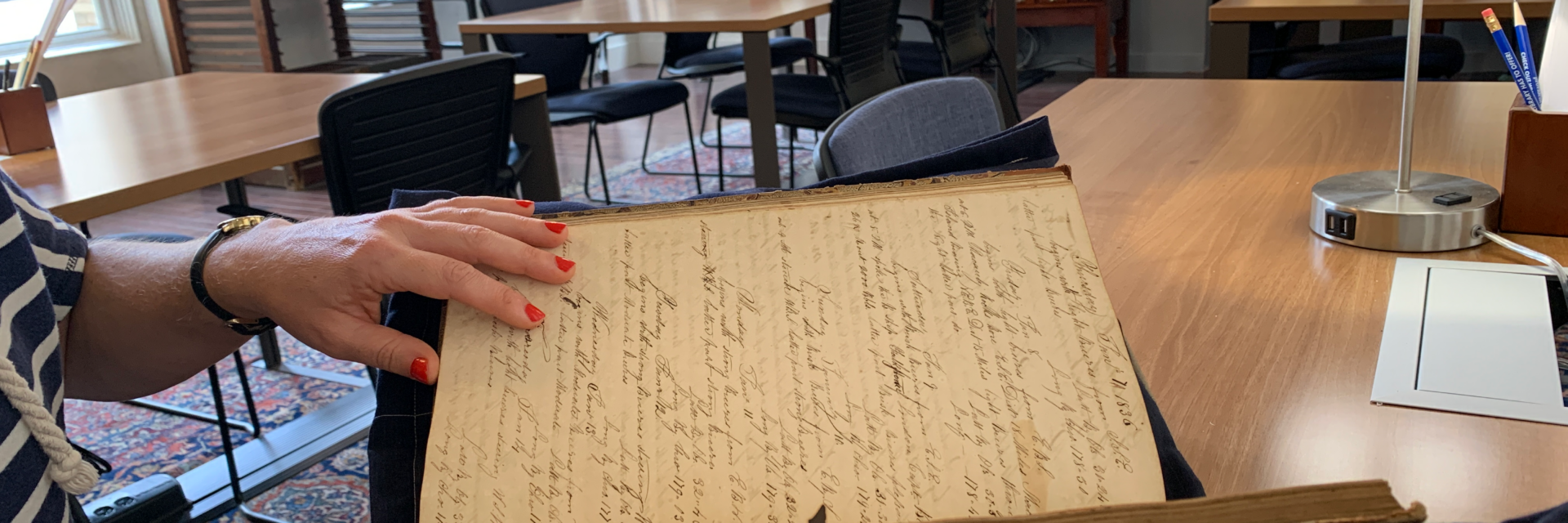Messages from centuries ago may offer insight for modern day climate research
An ongoing collaborative effort by Woods Hole Oceanographic Institution (WHOI), University of Massachusetts Dartmouth (UMassD), and Providence Public Library (PPL), has received a grant from Rhode Island-based FM Global, an insurance company that has focused on research and science-based ways to mitigate property risk for years.
Over the next three years, FM Global is providing $450k total to PPL, of which WHOI will receive $175k total from PPL as a subaward for its climate research component of the project. UMassD will receive $75K total for coordination and oversight of the archival research component.
The project is investigating the role of historical weather data in current climate change research, and the increasingly urgent issues surrounding it. Investigators will do so through the review and extraction of weather observations from thousands of centuries-old records.
First developed in 2019 by Dr. Caroline Ummenhofer, WHOI oceanographer and climate scientist, and Dr. Timothy Walker, a maritime historian at UMassD, the project focuses on extracting weather data from whaling ship logbooks dating as far back as the late 1700s. This data will then be analyzed in order to make it comparable to modern weather readings, which will help address contemporary questions of climate change.
“This funding will greatly aid us in transferring qualitative descriptions to quantitative weather data for scientists to use in their studies, for example to detect shifting wind and pressure patterns with climate change,” said Ummenhofer.
“We want to gain a better understanding of how past climate and weather changes can be connected to present day changes,” added Walker. “We have more than 5,000 logbooks that will provide valuable information.”
“We have long known that the historical information contained in PPL’s Nicholson Whaling Collection is extremely valuable and we are excited for this partnership and that the Library’s vast collection of nearly 800 digitized whaling logbooks will be mined for this important research,” said Jordan Goffin, Head Curator of Collections at PPL.
“During the decades over which this collection was built, cataloged, and digitized no one involved expected it would be used for critical research like this. The current project is a testament to the enduring and evolving power of historical artifacts.”
The goal of the project is to help scientists understand weather patterns over past centuries, which is useful for modern ocean navigation, commerce, supply chain planning, coastal management, and national defense. Putting extreme events, like severe storms, into a long-term context is one of the main goals of this project, to better help vulnerable communities plan for extreme weather disasters in the future.
Ummenhofer and Walker have successfully completed the project’s foundational first phase: refining data collection processes, creating an online data collection tool, and kicking off the first year of the data mining portion, with support from the National Science Foundation.
About Woods Hole Oceanographic Institution:
The Woods Hole Oceanographic Institution (WHOI) is a private, non-profit organization on Cape Cod, Massachusetts, dedicated to marine research, engineering, and higher education. Established in 1930, its primary mission is to understand the ocean and its interaction with the Earth as a whole, and to communicate an understanding of the ocean’s role in the changing global environment. WHOI’s pioneering discoveries stem from an ideal combination of science and engineering—one that has made it one of the most trusted and technically advanced leaders in basic and applied ocean research and exploration anywhere. WHOI is known for its multidisciplinary approach, superior ship operations, and unparalleled deep-sea robotics capabilities. We play a leading role in ocean observation and operate the most extensive suite of data-gathering platforms in the world. Top scientists, engineers, and students collaborate on more than 800 concurrent projects worldwide—both above and below the waves—pushing the boundaries of knowledge and possibility. For more information, please visit www.whoi.edu
About Providence Public Library
PPL is an independent, non-profit organization founded in 1875, governed by a Board of Trustees, and supported primarily through private funding sources, including its own PPL Foundation. The Library’s mission is to inspire Rhode Islanders to be lifelong learners by engaging their curiosity and offering access to extraordinary experiences, resources, and ideas. PPL’s programs help to democratize education and opportunity, especially for those who are oppressed from opportunity. PPL strives to connect learners to resources, to new, in-demand skill sets, to jobs, and to each other. Thanks to a century and a half of collecting, the library is home to tens of thousands of historic books, manuscripts, photographs, ephemera, maps and other artifacts representing over four thousand years of human history and culture from around the world. In addition to providing access to its unique Special Collections, PPL also serves as the Statewide Reference Resource Center. For more, visit www.provlib.org.
PHOTO: Whaling ship logbooks, like this one, from past centuries contain historical weather data, giving researchers a glimpse of what the climate was like years ago. That data now presents the opportunity to address contemporary questions of climate change. Photo by Jordan Goffin.
